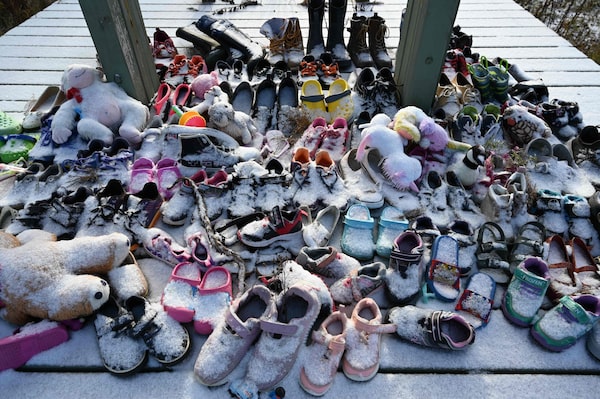
Opposition parties and advocates have repeatedly called the federal government’s approach to the cases harmful to First Nations children.MARION THIBAUT/AFP/Getty Images
Federal Conservative Leader Erin O’Toole says he supports a multibillion-dollar compensation agreement Ottawa negotiated for First Nations children over the failures of the child welfare system, adding he is not concerned about the cost.
“Personally, I don’t think the amount is important. It’s reconciliation that matters,” Mr. O’Toole said on Thursday during his first news conference of the year.
The federal government announced agreements in principle in December and released details this week. The deal includes $20-billion to compensate First Nations children and $20-billion for long-term reform of child welfare.
Mr. O’Toole was asked if he was comfortable with the compensation offer.
“Reconciliation is a priority for me and for my caucus,” Mr. O’Toole said on Parliament Hill. “I thought it was positive to see a resolution ... between the federal government and the First Nations and Indigenous children. The situation was unacceptable and that’s why we’re generally in favour of this resolution.”
He said there’s a need to work in co-operation with First Nations on programs for children and to base such work on reconciliation.
In December, the federal government said it would earmark $40-billion to compensate First Nations children and families for discrimination in Canada’s child-welfare system and to pay for long-term reform, in hopes of settling a Canadian Human Rights Tribunal (CHRT) case and separate class-action lawsuits before the end of 2021.
The government reached the agreements on New Year’s Eve after negotiations involving parties to the tribunal case – the Assembly of First Nations (AFN) and the First Nations Child and Family Caring Society – and representatives of the class-action lawsuits related to Indigenous child welfare.
The Conservative government led by prime minister Stephen Harper had found itself on the other side of the issue from the party’s current leader. In 2007, the Caring Society and the AFN brought the human-rights complaint to the tribunal, alleging inequitable funding for child welfare on reserves.
Ruling forced Ottawa into child welfare deal, says Cindy Blackstock
Nearly half of federally incarcerated women are Indigenous, evidence of ‘public policy failures’
On Thursday, Mr. O’Toole said: “Having a serious approach to reconciliation means that we don’t have First Nations, particularly advocates for children, having to go to courts or tribunals to move the federal government to act.”
Ottawa was keen to reach a settlement on the controversial issue. Opposition parties and advocates have repeatedly called the federal government’s approach to the cases harmful to First Nations children.
The $40-billion pledge is related to the class-action lawsuits and a court battle over the tribunal’s finding that required Ottawa to provide up to $40,000 in compensation to each First Nations child unnecessarily taken into care because of underfunded government services since 2006. The order also required payments to parents and grandparents.
In October, the government announced it would appeal a Federal Court decision from the month before that upheld the CHRT finding, despite calls not to pursue further legal action from representatives of the Canadian Bar Association, the Canadian Medical Association and opposition parties.
Ottawa also said at the time that it had agreed to pause the litigation while it negotiated outside of court with First Nations groups.
On another issue, Mr. O’Toole said Conservatives will convene an emergency meeting of Parliament’s standing committee on health to examine “critical gaps” in Canada’s ability to effectively manage COVID-19 variants despite high vaccination rates.
The committee has 12 members: four Conservatives, six Liberals, one New Democrat and one member of the Bloc Québécois.
For subscribers: Get exclusive political news and analysis by signing up for the Politics Briefing.